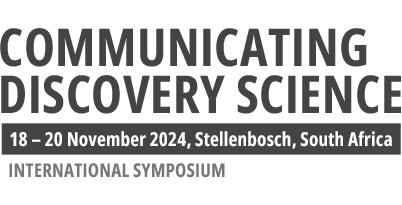Speaker feature
Dr John Besley: a vision for strategic science communication
Dr. John Besley, Ellis N. Brandt Professor of Public Relations at Michigan State University, focuses his research on public perceptions of science and scientists’ opinions about the public. His goal is to enhance the effectiveness of science communicators by promoting evidence-based, strategic approaches. His work also delves into how peoples’ views about decision-makers and decision processes affect their overall attitudes towards science and technology.
Besley visited South Africa to participate in the Communicating Discovery Science Symposium in Stellenbosch, South Africa. The November event was organised by Stellenbosch University’s Centre for Research on Evaluation, Science and Technology (CREST) with support from the Kavli Foundation. It brought together scientists and science communication experts to discuss the nuances and research behind communicating basic science.
During a break from the symposium sessions, Besley shared his insights on the need for scientists to identify clear behavioural goals and design ethical communication strategies around achieving those goals over the long term. He emphasised the need for continuous learning and adaptation to enhance the field of science communication.
Defining audience-focused goals
“Scientists need to think beyond communicating for its own sake,” Besley asserts. In his book Strategic Science Communication: A Guide to Setting the Right Objectives for More Effective Public Engagement, he emphasises the importance of defining audience-specific behavioural goals as the foundation for effective communication. “Once you know what you want your audience to consider doing, then you can start having meaningful conversations about how to achieve those goals,” he explains.
Besley highlights several key communication objectives, including conveying risks and benefits, influencing perceived social norms (what you believe others do an expect ), communicating self-efficacy, and trustworthiness. For instance, understanding how people perceive risks or benefits is just one layer of influencing behaviour. “It’s not just about what they think or feel,” Besley notes. “It’s about what they believe they can do and what others think is important.”
Trust is another critical element in Besley’s approach. “You can’t just say, ‘Trust me,'” he points out. Instead, scientists must demonstrate expertise, integrity, caring, openness, and shared values. “Here’s why I think you should consider me competent in this area. Here’s what my motives are. Here’s why I’m listening to and value your perspective,” he elaborates.
By clearly communicating these attributes, scientists can better build meaningful connections with their audiences. “People don’t automatically see you as caring or honest—you have to show it in your words and actions,” he emphasises.
Besley advocates for a deliberate approach to science communication. “I want scientists to identify their goals before they design communication choices,” he says. For instance, if the goal is to encourage people to rely more on science to address complex problems, communication efforts should focus on highlighting the benefits, accessibility, and societal value of scientific solutions.
He also stresses the importance of collaboration between strategists and technical communicators. “In the real world, there are writers, designers, and videographers who excel at their craft. But strategists are the ones who ask, ‘Why are we doing this?’” Besley explains. The absence of such strategic thinking in the scientific community is a significant challenge.
Challenges in communicating discovery science
Besley acknowledges the unique challenges faced by basic scientists in communication. While applied scientists often pursue clear, practical goals, discovery scientists grapple with broader and less tangible goals. “Basic scientists might aim to inspire kids to pursue STEM careers or foster a love for science,” Besley notes. However, these goals don’t always directly connect to their research.
He critiques the assumption that fostering a general love for science will automatically lead to public support for issues like climate change. “It’s a tacit theory but not a direct logic model,” he explains. Instead, Besley urges scientists to identify context-specific goals that align with the broader needs of the scientific community.
Effective science communication, he argues, requires continuous learning and adaptation. Scientists should reflect on the outcomes they hope to achieve and the steps needed to reach them. “If you want people to experience wonder, it’s helpful to ask what you expect will happen as a result of that awe and wonder because trying to foster these objectives might not be the only path forward.”
This reflective process benefits from a knowledgeable team to challenge assumptions and refine science communication strategies. “You need people who can push back on scientists and ask the tough questions,” Besley states.
Besley’s vision extends beyond individual efforts to the broader scientific community. He calls for a shift from an education-centric model to one that prioritises strategic outcomes. “We’re not just communicating science for its own sake. We’re communicating to achieve specific ends in ethical ways,” he emphasises.
Dr John Besley, Ellis N. Brandt Professor of Public Relations at Michigan State University.
Session recording
Watch the session: North American discovery scientists’ communication goals


